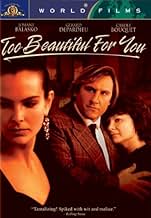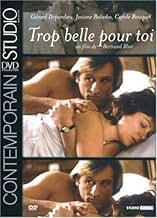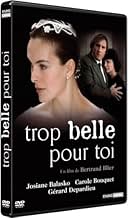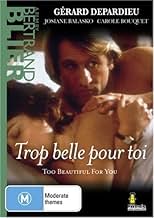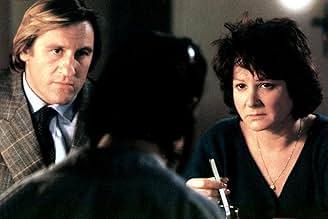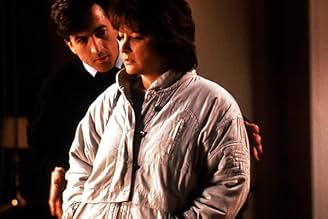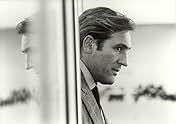IMDb RATING
6.6/10
3.2K
YOUR RATING
A sharp love triangle is formed by a wealthy businessman.A sharp love triangle is formed by a wealthy businessman.A sharp love triangle is formed by a wealthy businessman.
- Awards
- 6 wins & 7 nominations total
Gérard Depardieu
- Bernard Barthélémy
- (as Gerard Depardieu)
Catherine Gillet
- La femme du train
- (uncredited)
Sylvie Orcier
- Marie-Catherine
- (uncredited)
- Director
- Writer
- All cast & crew
- Production, box office & more at IMDbPro
Featured reviews
In this clever take on love and relationships, the affairs of three people are enigmatically portrayed. Everyone adores Bernard's wife Florence. His friends lust for her, her friends envy her. She is very beautiful, and for Bernard there is nothing more left to desire. And that is precisely what troubles him: she may just be too beautiful. His secretary, a temp named Colette, is completely the opposite to Florence. But in her physical unattractiveness Bernard finds a refuge to his peculiar dilemma. Despite of what may seem as a logical explanation, he is not plagued by an inferiority complex. What drives Bernard is the psychological force of the middle-age crisis. Some people wonder whether what they have is as good as it gets. Bernard actually knows that. The second he is near Florence he knows that that is true; gazes of his friends reassure him in that.
With Colette, however, he feels completely at ease. There is no need for self-assertion and he is free to choose. Naturally, there is much more to this film, which is full of surprises and unexpected events. The only country where such a complex and somewhat surrealistic plot could have been brought to life, where careful avoidance of turning the film into a soap opera, a pointless comedy, or a tedious drama meets with the bittersweet taste of love and desire is France, and the philosophy of love, the satire, and the superb acting -- Depardieu, Bouquet, and Balasko make a lovely team -- are also typically French here. Ironically enough, the question of the age is inverted to "what does a MAN want?"
With Colette, however, he feels completely at ease. There is no need for self-assertion and he is free to choose. Naturally, there is much more to this film, which is full of surprises and unexpected events. The only country where such a complex and somewhat surrealistic plot could have been brought to life, where careful avoidance of turning the film into a soap opera, a pointless comedy, or a tedious drama meets with the bittersweet taste of love and desire is France, and the philosophy of love, the satire, and the superb acting -- Depardieu, Bouquet, and Balasko make a lovely team -- are also typically French here. Ironically enough, the question of the age is inverted to "what does a MAN want?"
Bertrand Blier is the French Pedro Almodovar: cynical and shocking. Either you love, either you hate his movies. Some of them have divided French public due to their shocking contents, notably "Les Valseuses" (1974). "Trop belle pour toi" appears like an exception in his work. It means that taste of Blier for provocation is less pronounced. However, it doesn't make the movie better for all that. It doesn't work for several reasons:
first, it's hard to follow the plot because Blier introduces sequences that are earlier or subsequent to the present scene. For example, we realize too late that Colette ( Balasko) after she left Bernard, married with a man and she had children. The movie ignores certain sequences that are however essential to the development of the plot.
Then, the movie irritates due to its main characters, it goes without saying that dialogs are the key to the good development of the plot. But here, you are under the impression that the characters don't exchange their words. They're talking in the emptiness and don't seem to care about the others' opinion!
Let's add that the movie, sometimes, creates a certain boredom because of some lifeless sequences that drag on (notably during dinners in Depardieu's ravishing house with his wife ( Bouquet) and all their guests.
In short, "trop belle pour toi" is a cold and no soul movie and it left me unsatisfied in spite of good ideas in the making ( Cluzet who expresses his anger with Schubert's music in the background played very loud). Even a trio of outstanding actors don't succeed in saving the movie.
Remark: Carole Bouquet won an Oscar in France in 1990, for her performance in this movie. Good for her.
first, it's hard to follow the plot because Blier introduces sequences that are earlier or subsequent to the present scene. For example, we realize too late that Colette ( Balasko) after she left Bernard, married with a man and she had children. The movie ignores certain sequences that are however essential to the development of the plot.
Then, the movie irritates due to its main characters, it goes without saying that dialogs are the key to the good development of the plot. But here, you are under the impression that the characters don't exchange their words. They're talking in the emptiness and don't seem to care about the others' opinion!
Let's add that the movie, sometimes, creates a certain boredom because of some lifeless sequences that drag on (notably during dinners in Depardieu's ravishing house with his wife ( Bouquet) and all their guests.
In short, "trop belle pour toi" is a cold and no soul movie and it left me unsatisfied in spite of good ideas in the making ( Cluzet who expresses his anger with Schubert's music in the background played very loud). Even a trio of outstanding actors don't succeed in saving the movie.
Remark: Carole Bouquet won an Oscar in France in 1990, for her performance in this movie. Good for her.
The few reviews here indicate that this is a film which provokes in some boredom and confusion, while other will find it provocative and daring in its originality. Maltin gives it a two-star rating and says "after a bright beginning, it goes absolutely nowhere." I was prepared to abandon the film after 15 minutes or so, but the absolutely gorgeous Schubert melodies that pervade the score and tie it all together....they kept me going with the film, and the fantastic photography, acting, and plot twists sustained my interest to the end.
Yes, the approach is surreal and the story-telling non-linear. Much of the dialog is brilliant, but it soon became obvious (to me, anyway) that these people are not actually saying these things to one another ... and what an interesting world it would be if we could say aloud all the things that we deeply feel! I cannot pretend to have understood it all, but the film had an intellectual appeal and, to repeat an earlier point, a ravishing score of Schubert pieces which adorn the film like precious jewels.
Yes, the approach is surreal and the story-telling non-linear. Much of the dialog is brilliant, but it soon became obvious (to me, anyway) that these people are not actually saying these things to one another ... and what an interesting world it would be if we could say aloud all the things that we deeply feel! I cannot pretend to have understood it all, but the film had an intellectual appeal and, to repeat an earlier point, a ravishing score of Schubert pieces which adorn the film like precious jewels.
I saw this film at least twice in the theaters and then again a few years later on DVD and loved it each time. To me, the reason it works so well might also be why some viewers might find it off-putting: much of what is presented on-screen is that of a subjective and unreliable narrator (Gerard Depardieu's character). Thus, scenes will often play out twice; first from the perspective of what he imagines, and then from a (possibly) more factual viewpoint. This applies to the other main characters as well, both his stunning wife and rather average secretary.
Each character in their own way sees themselves at the center of the story, though the film mostly follows the path of Depardieu. We are left to wonder why he'd embark on this affair in the first place, and though I can think of a few plausible answers, it might just be: sometimes people make choices that they themselves could not explain, but they do it anyway. As viewers, we are just there for the ride.
There is also plenty of humor throughout, both poking a little fun at the whole love triangle concept, and a range of upper middle-class conceits in addition. It's by no means a critique or polemic though; it's just that a lot of life really CAN be sort of silly if you take a few steps back. To me, the way the film is told and shot indicates that the director feels empathy for each of the three characters, and no one is entirely hero or villain. At the same time the movie might well be a commentary on the tendency of the way people go running in circles, chasing their own tale in the name of happiness. Either way, it ably straddles both the dramatic and comedic in a manner that French cinema often does better than any other.
Each character in their own way sees themselves at the center of the story, though the film mostly follows the path of Depardieu. We are left to wonder why he'd embark on this affair in the first place, and though I can think of a few plausible answers, it might just be: sometimes people make choices that they themselves could not explain, but they do it anyway. As viewers, we are just there for the ride.
There is also plenty of humor throughout, both poking a little fun at the whole love triangle concept, and a range of upper middle-class conceits in addition. It's by no means a critique or polemic though; it's just that a lot of life really CAN be sort of silly if you take a few steps back. To me, the way the film is told and shot indicates that the director feels empathy for each of the three characters, and no one is entirely hero or villain. At the same time the movie might well be a commentary on the tendency of the way people go running in circles, chasing their own tale in the name of happiness. Either way, it ably straddles both the dramatic and comedic in a manner that French cinema often does better than any other.
"Elle est trop belle" is a romantic drama overflowing with a refined yet vulgar sensuality that is common in French films. Sexuality, lust, infidelity are the main themes of the film, and are lusciously exhibited on screen. Choice of music was excellent, with Schubert in the background providing beauty and consolation in midst of heightened drama. You have fancy dinners, spacious mansions and country homes. Certainly men of culture will appreciate this film.
Acting in scenes was mostly naturalistic and plain, though not completely without emotion. Overall tempo of the movie was slow and relaxed, taking plenty of time to establish scenes and characters. Sometimes even bordering on boredom. Focus was not purely based on intense emotions of infatuation and cliched notions of romanticism, but the human relationships between the characters.
The unoriginality of the subject matter and the lack of subversiveness in the message, however, dims the glow of its achievements. The sudden middle-life crisis and the marital unhappiness of a well-to-do middle class couple has been well documented in the history of film, and there have been better portrayals of it. The movie is heavy-handed with its message of internal and external beauty.
There might have been some critique of the boredom of the perfect bourgeoisie life, but it is soo brief, indirect and inconsequential you could easily miss it. It seems the down-to-earth nature and vividness of Colette is contrasted with the icy and cold demeanor of the proper Florence, and the white spacious family home with the small run-down motel.
In the end, the story felt quite simple and predictable, even cliched. While watching it for the first time was a pleasant experience, there is probably little one can gain from rewatching the film. Overall, it is a decent film, doing its job well, but nothing out of the ordinary. Though I do admire the movie in other respects, the script just doesn't make it.
Acting in scenes was mostly naturalistic and plain, though not completely without emotion. Overall tempo of the movie was slow and relaxed, taking plenty of time to establish scenes and characters. Sometimes even bordering on boredom. Focus was not purely based on intense emotions of infatuation and cliched notions of romanticism, but the human relationships between the characters.
The unoriginality of the subject matter and the lack of subversiveness in the message, however, dims the glow of its achievements. The sudden middle-life crisis and the marital unhappiness of a well-to-do middle class couple has been well documented in the history of film, and there have been better portrayals of it. The movie is heavy-handed with its message of internal and external beauty.
There might have been some critique of the boredom of the perfect bourgeoisie life, but it is soo brief, indirect and inconsequential you could easily miss it. It seems the down-to-earth nature and vividness of Colette is contrasted with the icy and cold demeanor of the proper Florence, and the white spacious family home with the small run-down motel.
In the end, the story felt quite simple and predictable, even cliched. While watching it for the first time was a pleasant experience, there is probably little one can gain from rewatching the film. Overall, it is a decent film, doing its job well, but nothing out of the ordinary. Though I do admire the movie in other respects, the script just doesn't make it.
Did you know
- TriviaIn the documentary Blier, Leconte, Tavernier: trois vies de cinéma (2020), Blier says it was hell to shoot.
- Quotes
Colette Chevassu: Beauty hurts.
- SoundtracksImpromptu Opus 90 No 2
Music by Franz Schubert
Piano: Odette Gartenlaub
édition CINE VALSE - D.D. PRODUCTIONS - ORLY FILMS -S.E.D.I.F.
- How long is Too Beautiful for You?Powered by Alexa
Details
Box office
- Gross US & Canada
- $1,776,440
- Opening weekend US & Canada
- $31,208
- Mar 4, 1990
- Gross worldwide
- $1,776,440
- Runtime
- 1h 31m(91 min)
- Sound mix
- Aspect ratio
- 2.35 : 1
Contribute to this page
Suggest an edit or add missing content

